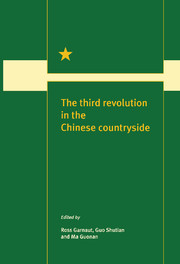Book contents
- Frontmatter
- Contents
- Figures
- Maps
- Tables
- Contributors
- Preface
- 1 The third revolution
- Feeding the people
- Marketing and price reform
- Internationalisation
- 12 The World Trade Organization and agricultural development
- 13 Comparative advantage and the internationalisation of China's agriculture
- 14 A turning point in China's agricultural development
- Regional issues
- Institutional change
- References
- Index
13 - Comparative advantage and the internationalisation of China's agriculture
from Internationalisation
Published online by Cambridge University Press: 04 August 2010
- Frontmatter
- Contents
- Figures
- Maps
- Tables
- Contributors
- Preface
- 1 The third revolution
- Feeding the people
- Marketing and price reform
- Internationalisation
- 12 The World Trade Organization and agricultural development
- 13 Comparative advantage and the internationalisation of China's agriculture
- 14 A turning point in China's agricultural development
- Regional issues
- Institutional change
- References
- Index
Summary
The experience of many economies shows that, with economic development, the share of agriculture in production and employment tends to fall. This is related to Engel's Law, which says that the ratio of food expenditure to total living expenditure declines as incomes rise. In other words, income elasticity of demand for food is less than unity. For grain, this relationship is especially strong. In a large economy (and in the world as a whole), foreign trade is not (and cannot be) large enough to prevent changes in demand being closely linked to changes in production. Consequently, as incomes grow, non-agricultural sectors employ a larger share of the total labour force, and produce a larger share of GDP. In the meantime, smaller shares of production and employment of agriculture would be enough to meet the needs of the national economy, especially with higher agricultural productivity. More of the social production capacity is therefore used to produce non-agricultural goods and services.
China's economic development strategy from the 1950s gave top priority to the development of heavy industry. Because heavy industry is highly capital intensive, the implementation of this strategy slowed the decline in the agricultural share, and lowered the pace of economic structural change.
Reform in rural China in the 1980s has resulted not only in increases in agricultural production but also in rapid changes in the industrial structure. Decline in the agricultural share became significant in the process of China's economic growth.
- Type
- Chapter
- Information
- The Third Revolution in the Chinese Countryside , pp. 172 - 183Publisher: Cambridge University PressPrint publication year: 1996

